Complexity in Project Management and the Management of Complex Projects
VerifiedAdded on 2023/06/05
|6
|1221
|75
AI Summary
This article discusses the impact of complexity on project management and the management of complex projects. It emphasizes the importance of both researchers as well as practitioners in completing a project successfully. The discussion states that the framework for establishing a complex project management as well as decision making is essential for an organization. The transaction series enables the design and also helps to deliver the project successfully.
Contribute Materials
Your contribution can guide someone’s learning journey. Share your
documents today.
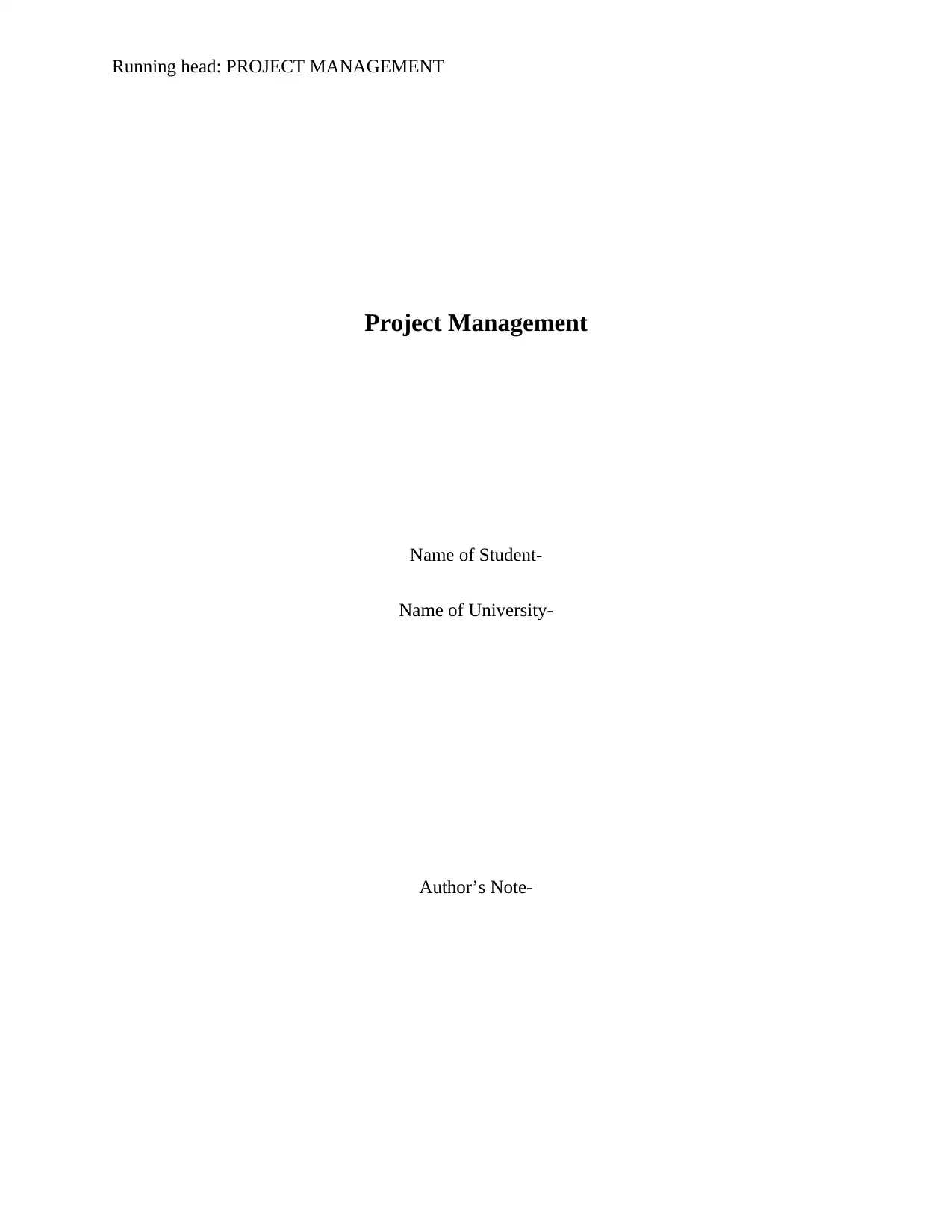
Running head: PROJECT MANAGEMENT
Project Management
Name of Student-
Name of University-
Author’s Note-
Project Management
Name of Student-
Name of University-
Author’s Note-
Secure Best Marks with AI Grader
Need help grading? Try our AI Grader for instant feedback on your assignments.
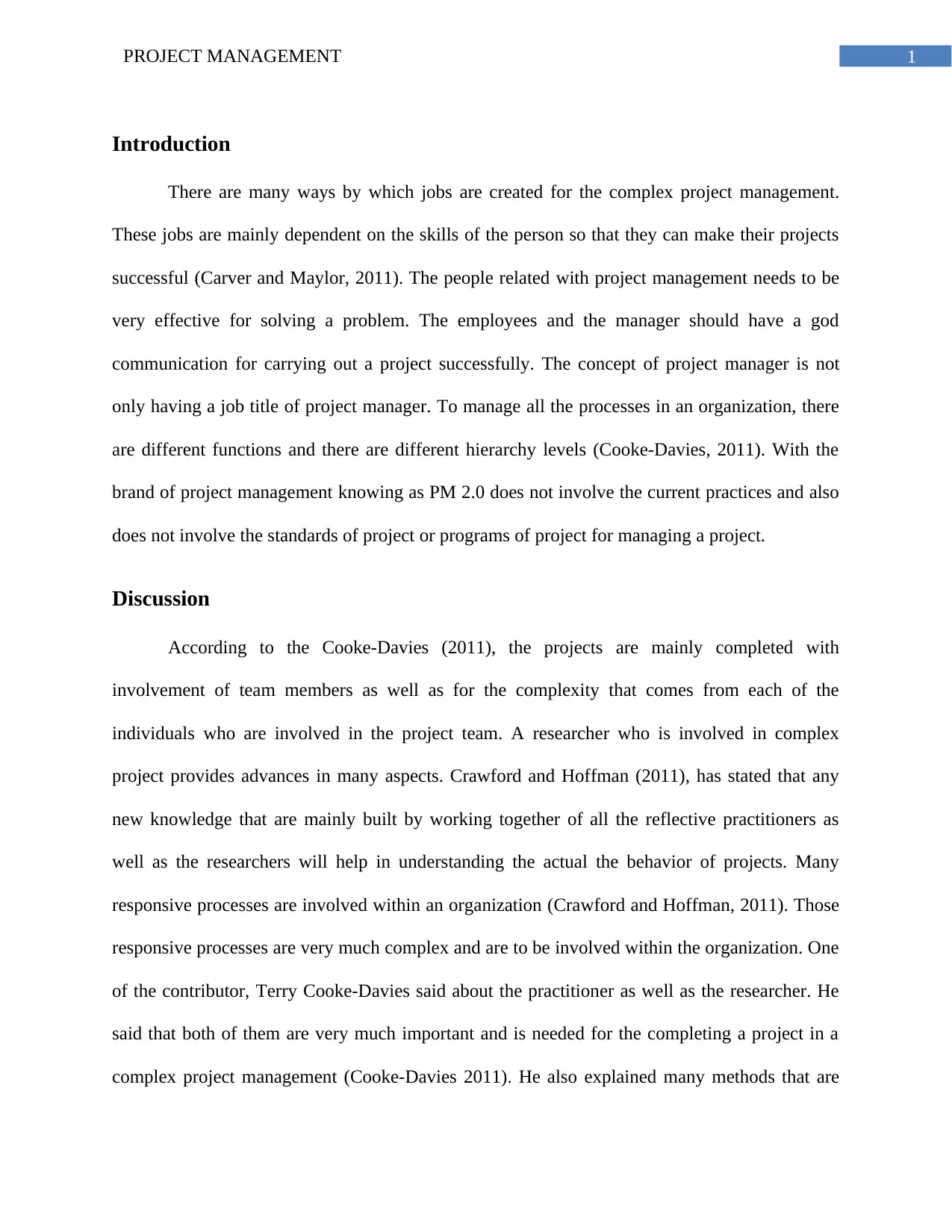
1PROJECT MANAGEMENT
Introduction
There are many ways by which jobs are created for the complex project management.
These jobs are mainly dependent on the skills of the person so that they can make their projects
successful (Carver and Maylor, 2011). The people related with project management needs to be
very effective for solving a problem. The employees and the manager should have a god
communication for carrying out a project successfully. The concept of project manager is not
only having a job title of project manager. To manage all the processes in an organization, there
are different functions and there are different hierarchy levels (Cooke-Davies, 2011). With the
brand of project management knowing as PM 2.0 does not involve the current practices and also
does not involve the standards of project or programs of project for managing a project.
Discussion
According to the Cooke-Davies (2011), the projects are mainly completed with
involvement of team members as well as for the complexity that comes from each of the
individuals who are involved in the project team. A researcher who is involved in complex
project provides advances in many aspects. Crawford and Hoffman (2011), has stated that any
new knowledge that are mainly built by working together of all the reflective practitioners as
well as the researchers will help in understanding the actual the behavior of projects. Many
responsive processes are involved within an organization (Crawford and Hoffman, 2011). Those
responsive processes are very much complex and are to be involved within the organization. One
of the contributor, Terry Cooke-Davies said about the practitioner as well as the researcher. He
said that both of them are very much important and is needed for the completing a project in a
complex project management (Cooke-Davies 2011). He also explained many methods that are
Introduction
There are many ways by which jobs are created for the complex project management.
These jobs are mainly dependent on the skills of the person so that they can make their projects
successful (Carver and Maylor, 2011). The people related with project management needs to be
very effective for solving a problem. The employees and the manager should have a god
communication for carrying out a project successfully. The concept of project manager is not
only having a job title of project manager. To manage all the processes in an organization, there
are different functions and there are different hierarchy levels (Cooke-Davies, 2011). With the
brand of project management knowing as PM 2.0 does not involve the current practices and also
does not involve the standards of project or programs of project for managing a project.
Discussion
According to the Cooke-Davies (2011), the projects are mainly completed with
involvement of team members as well as for the complexity that comes from each of the
individuals who are involved in the project team. A researcher who is involved in complex
project provides advances in many aspects. Crawford and Hoffman (2011), has stated that any
new knowledge that are mainly built by working together of all the reflective practitioners as
well as the researchers will help in understanding the actual the behavior of projects. Many
responsive processes are involved within an organization (Crawford and Hoffman, 2011). Those
responsive processes are very much complex and are to be involved within the organization. One
of the contributor, Terry Cooke-Davies said about the practitioner as well as the researcher. He
said that both of them are very much important and is needed for the completing a project in a
complex project management (Cooke-Davies 2011). He also explained many methods that are
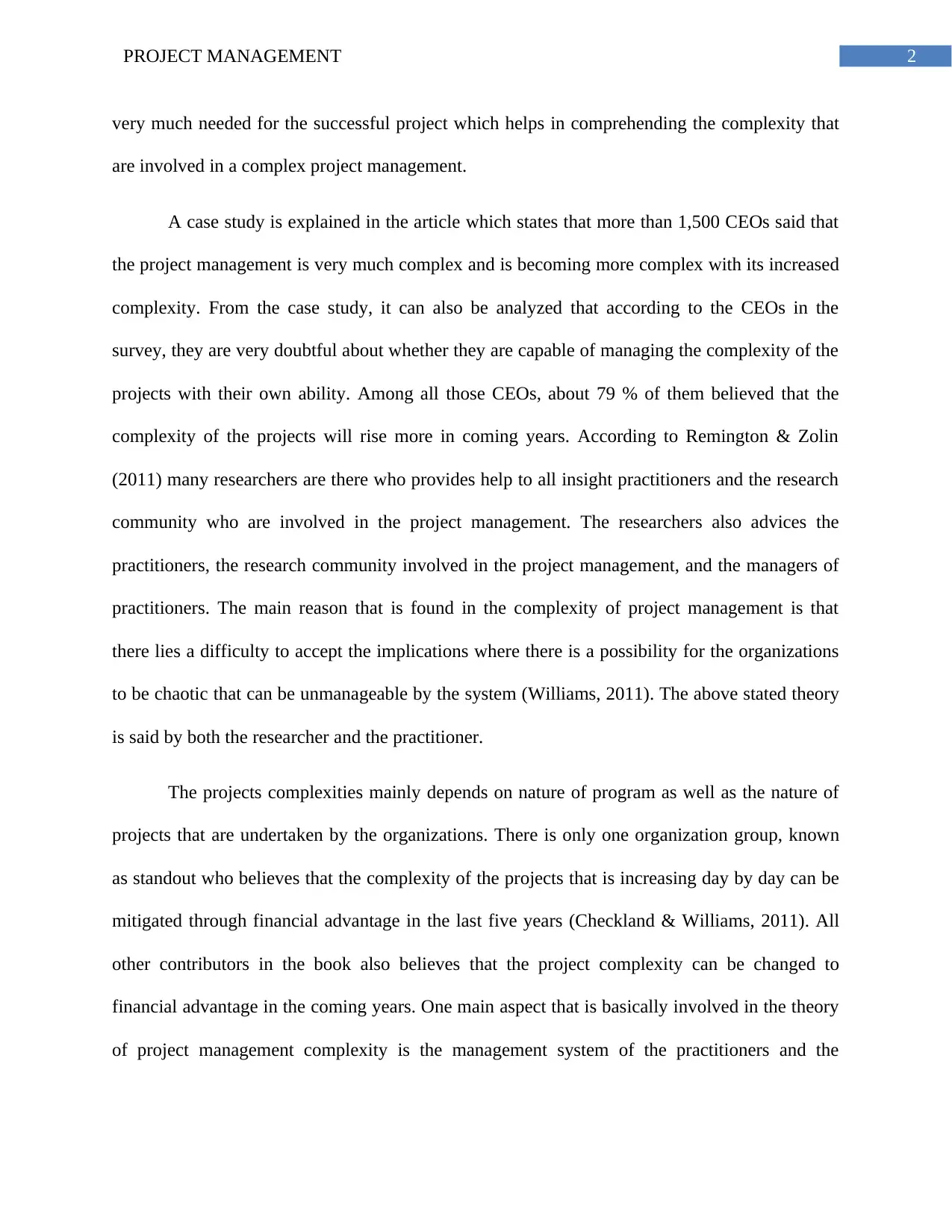
2PROJECT MANAGEMENT
very much needed for the successful project which helps in comprehending the complexity that
are involved in a complex project management.
A case study is explained in the article which states that more than 1,500 CEOs said that
the project management is very much complex and is becoming more complex with its increased
complexity. From the case study, it can also be analyzed that according to the CEOs in the
survey, they are very doubtful about whether they are capable of managing the complexity of the
projects with their own ability. Among all those CEOs, about 79 % of them believed that the
complexity of the projects will rise more in coming years. According to Remington & Zolin
(2011) many researchers are there who provides help to all insight practitioners and the research
community who are involved in the project management. The researchers also advices the
practitioners, the research community involved in the project management, and the managers of
practitioners. The main reason that is found in the complexity of project management is that
there lies a difficulty to accept the implications where there is a possibility for the organizations
to be chaotic that can be unmanageable by the system (Williams, 2011). The above stated theory
is said by both the researcher and the practitioner.
The projects complexities mainly depends on nature of program as well as the nature of
projects that are undertaken by the organizations. There is only one organization group, known
as standout who believes that the complexity of the projects that is increasing day by day can be
mitigated through financial advantage in the last five years (Checkland & Williams, 2011). All
other contributors in the book also believes that the project complexity can be changed to
financial advantage in the coming years. One main aspect that is basically involved in the theory
of project management complexity is the management system of the practitioners and the
very much needed for the successful project which helps in comprehending the complexity that
are involved in a complex project management.
A case study is explained in the article which states that more than 1,500 CEOs said that
the project management is very much complex and is becoming more complex with its increased
complexity. From the case study, it can also be analyzed that according to the CEOs in the
survey, they are very doubtful about whether they are capable of managing the complexity of the
projects with their own ability. Among all those CEOs, about 79 % of them believed that the
complexity of the projects will rise more in coming years. According to Remington & Zolin
(2011) many researchers are there who provides help to all insight practitioners and the research
community who are involved in the project management. The researchers also advices the
practitioners, the research community involved in the project management, and the managers of
practitioners. The main reason that is found in the complexity of project management is that
there lies a difficulty to accept the implications where there is a possibility for the organizations
to be chaotic that can be unmanageable by the system (Williams, 2011). The above stated theory
is said by both the researcher and the practitioner.
The projects complexities mainly depends on nature of program as well as the nature of
projects that are undertaken by the organizations. There is only one organization group, known
as standout who believes that the complexity of the projects that is increasing day by day can be
mitigated through financial advantage in the last five years (Checkland & Williams, 2011). All
other contributors in the book also believes that the project complexity can be changed to
financial advantage in the coming years. One main aspect that is basically involved in the theory
of project management complexity is the management system of the practitioners and the
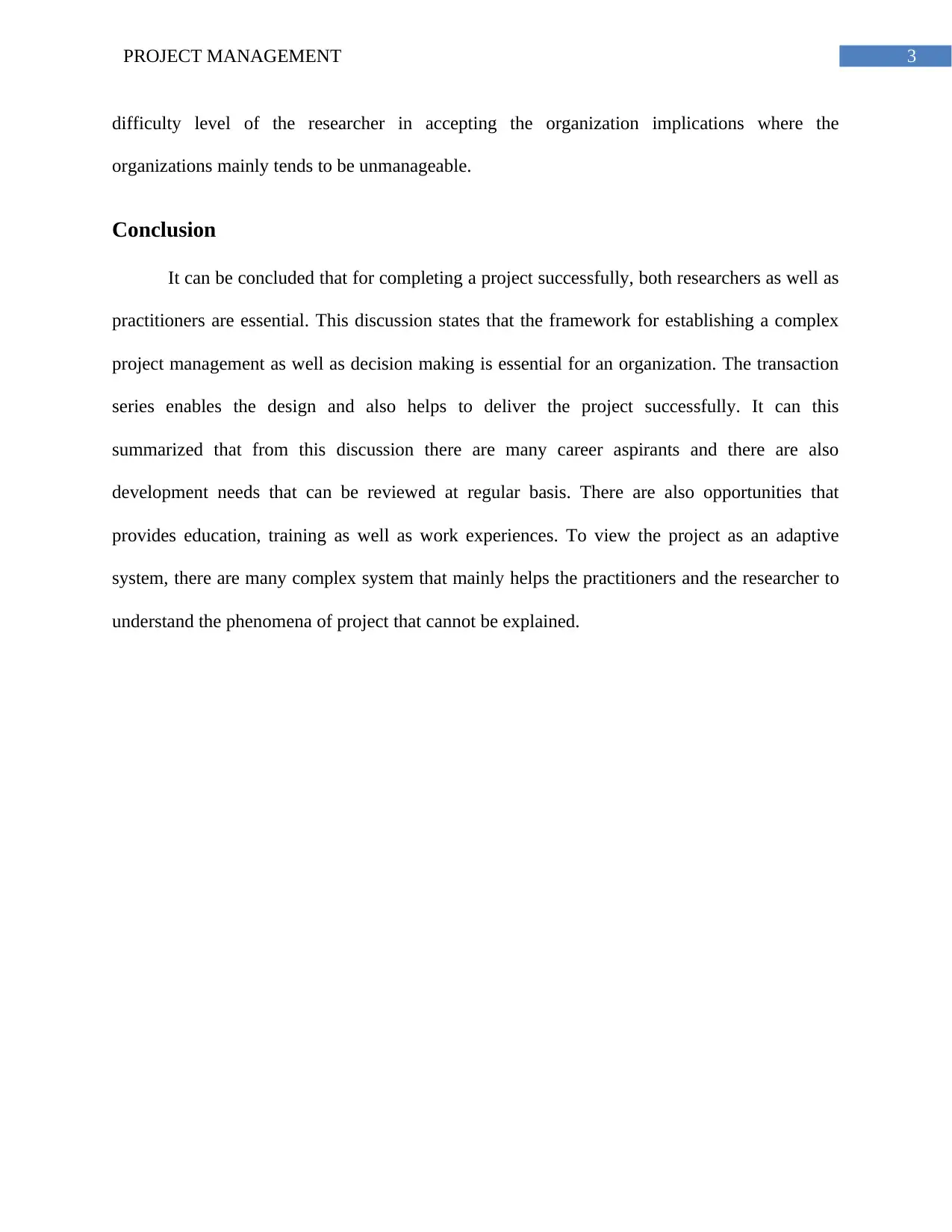
3PROJECT MANAGEMENT
difficulty level of the researcher in accepting the organization implications where the
organizations mainly tends to be unmanageable.
Conclusion
It can be concluded that for completing a project successfully, both researchers as well as
practitioners are essential. This discussion states that the framework for establishing a complex
project management as well as decision making is essential for an organization. The transaction
series enables the design and also helps to deliver the project successfully. It can this
summarized that from this discussion there are many career aspirants and there are also
development needs that can be reviewed at regular basis. There are also opportunities that
provides education, training as well as work experiences. To view the project as an adaptive
system, there are many complex system that mainly helps the practitioners and the researcher to
understand the phenomena of project that cannot be explained.
difficulty level of the researcher in accepting the organization implications where the
organizations mainly tends to be unmanageable.
Conclusion
It can be concluded that for completing a project successfully, both researchers as well as
practitioners are essential. This discussion states that the framework for establishing a complex
project management as well as decision making is essential for an organization. The transaction
series enables the design and also helps to deliver the project successfully. It can this
summarized that from this discussion there are many career aspirants and there are also
development needs that can be reviewed at regular basis. There are also opportunities that
provides education, training as well as work experiences. To view the project as an adaptive
system, there are many complex system that mainly helps the practitioners and the researcher to
understand the phenomena of project that cannot be explained.
Secure Best Marks with AI Grader
Need help grading? Try our AI Grader for instant feedback on your assignments.
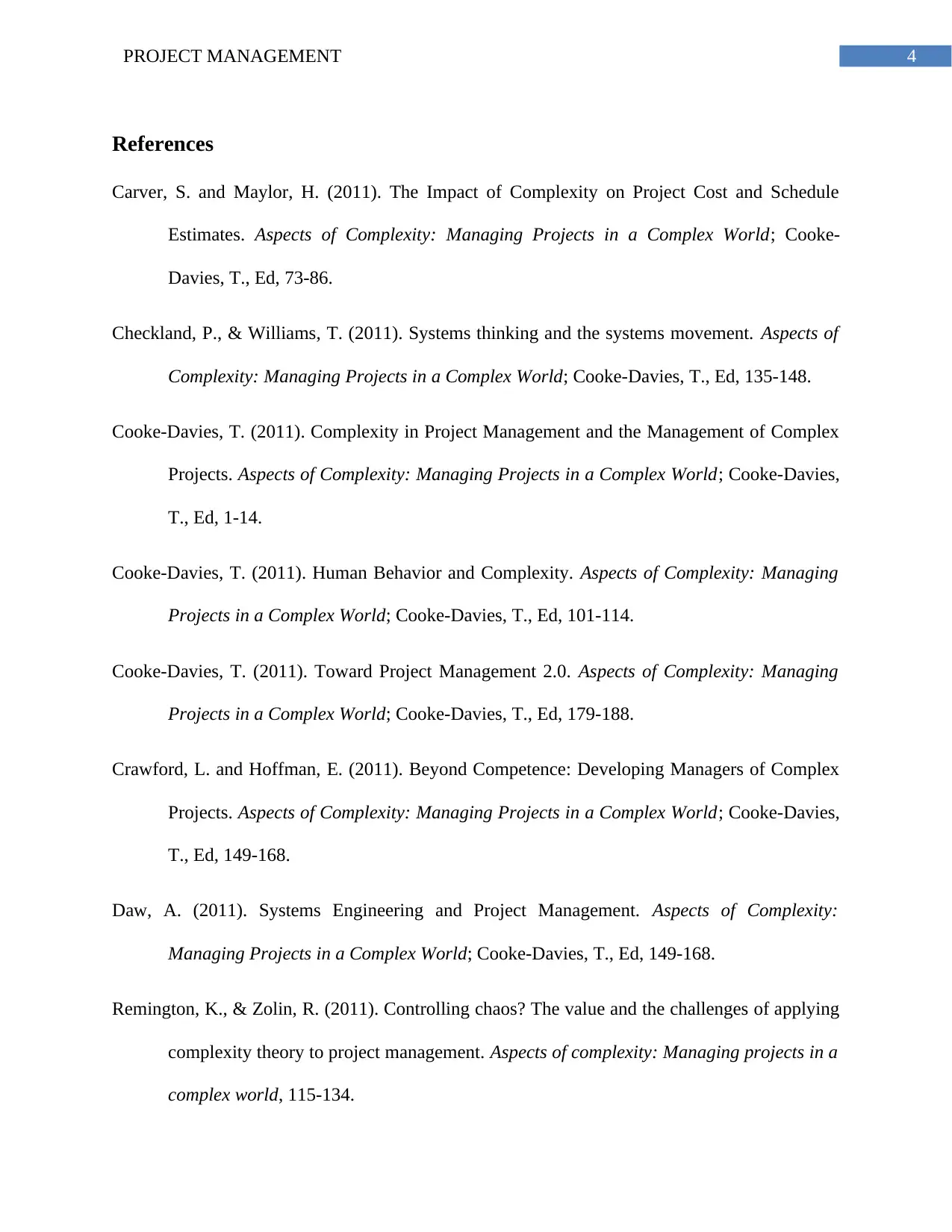
4PROJECT MANAGEMENT
References
Carver, S. and Maylor, H. (2011). The Impact of Complexity on Project Cost and Schedule
Estimates. Aspects of Complexity: Managing Projects in a Complex World; Cooke-
Davies, T., Ed, 73-86.
Checkland, P., & Williams, T. (2011). Systems thinking and the systems movement. Aspects of
Complexity: Managing Projects in a Complex World; Cooke-Davies, T., Ed, 135-148.
Cooke-Davies, T. (2011). Complexity in Project Management and the Management of Complex
Projects. Aspects of Complexity: Managing Projects in a Complex World; Cooke-Davies,
T., Ed, 1-14.
Cooke-Davies, T. (2011). Human Behavior and Complexity. Aspects of Complexity: Managing
Projects in a Complex World; Cooke-Davies, T., Ed, 101-114.
Cooke-Davies, T. (2011). Toward Project Management 2.0. Aspects of Complexity: Managing
Projects in a Complex World; Cooke-Davies, T., Ed, 179-188.
Crawford, L. and Hoffman, E. (2011). Beyond Competence: Developing Managers of Complex
Projects. Aspects of Complexity: Managing Projects in a Complex World; Cooke-Davies,
T., Ed, 149-168.
Daw, A. (2011). Systems Engineering and Project Management. Aspects of Complexity:
Managing Projects in a Complex World; Cooke-Davies, T., Ed, 149-168.
Remington, K., & Zolin, R. (2011). Controlling chaos? The value and the challenges of applying
complexity theory to project management. Aspects of complexity: Managing projects in a
complex world, 115-134.
References
Carver, S. and Maylor, H. (2011). The Impact of Complexity on Project Cost and Schedule
Estimates. Aspects of Complexity: Managing Projects in a Complex World; Cooke-
Davies, T., Ed, 73-86.
Checkland, P., & Williams, T. (2011). Systems thinking and the systems movement. Aspects of
Complexity: Managing Projects in a Complex World; Cooke-Davies, T., Ed, 135-148.
Cooke-Davies, T. (2011). Complexity in Project Management and the Management of Complex
Projects. Aspects of Complexity: Managing Projects in a Complex World; Cooke-Davies,
T., Ed, 1-14.
Cooke-Davies, T. (2011). Human Behavior and Complexity. Aspects of Complexity: Managing
Projects in a Complex World; Cooke-Davies, T., Ed, 101-114.
Cooke-Davies, T. (2011). Toward Project Management 2.0. Aspects of Complexity: Managing
Projects in a Complex World; Cooke-Davies, T., Ed, 179-188.
Crawford, L. and Hoffman, E. (2011). Beyond Competence: Developing Managers of Complex
Projects. Aspects of Complexity: Managing Projects in a Complex World; Cooke-Davies,
T., Ed, 149-168.
Daw, A. (2011). Systems Engineering and Project Management. Aspects of Complexity:
Managing Projects in a Complex World; Cooke-Davies, T., Ed, 149-168.
Remington, K., & Zolin, R. (2011). Controlling chaos? The value and the challenges of applying
complexity theory to project management. Aspects of complexity: Managing projects in a
complex world, 115-134.

5PROJECT MANAGEMENT
Shermon, D. (2011). The Impact of Complexity on Project Cost and Schedule Estimates. Aspects
of Complexity: Managing Projects in a Complex World; Cooke-Davies, T., Ed, 73-86.
Williams, T. (2011). Toward a Coherent Research Agenda. Aspects of Complexity: Managing
Projects in a Complex World; Cooke-Davies, T., Ed, 171-178.
Shermon, D. (2011). The Impact of Complexity on Project Cost and Schedule Estimates. Aspects
of Complexity: Managing Projects in a Complex World; Cooke-Davies, T., Ed, 73-86.
Williams, T. (2011). Toward a Coherent Research Agenda. Aspects of Complexity: Managing
Projects in a Complex World; Cooke-Davies, T., Ed, 171-178.
1 out of 6
Related Documents
Your All-in-One AI-Powered Toolkit for Academic Success.
+13062052269
info@desklib.com
Available 24*7 on WhatsApp / Email
![[object Object]](/_next/static/media/star-bottom.7253800d.svg)
Unlock your academic potential
© 2024 | Zucol Services PVT LTD | All rights reserved.



